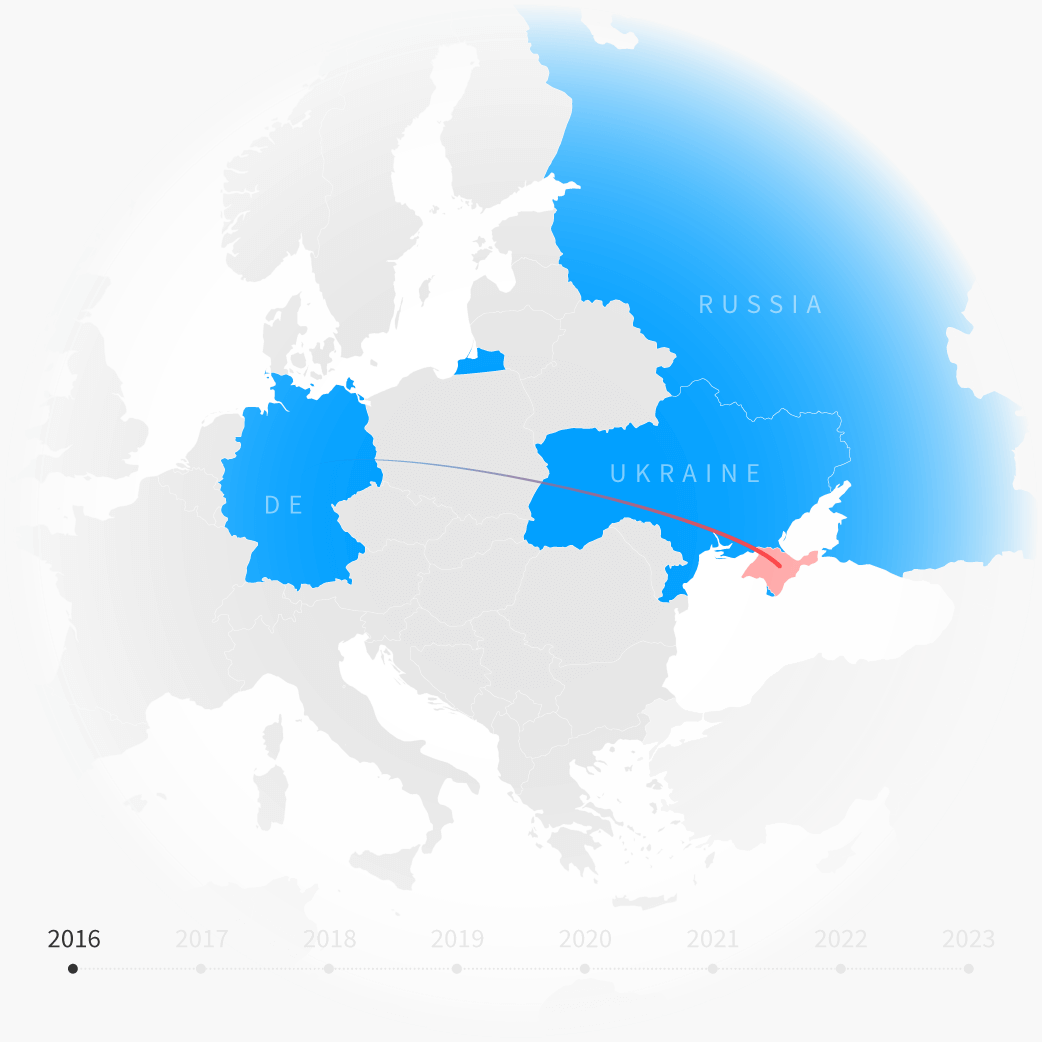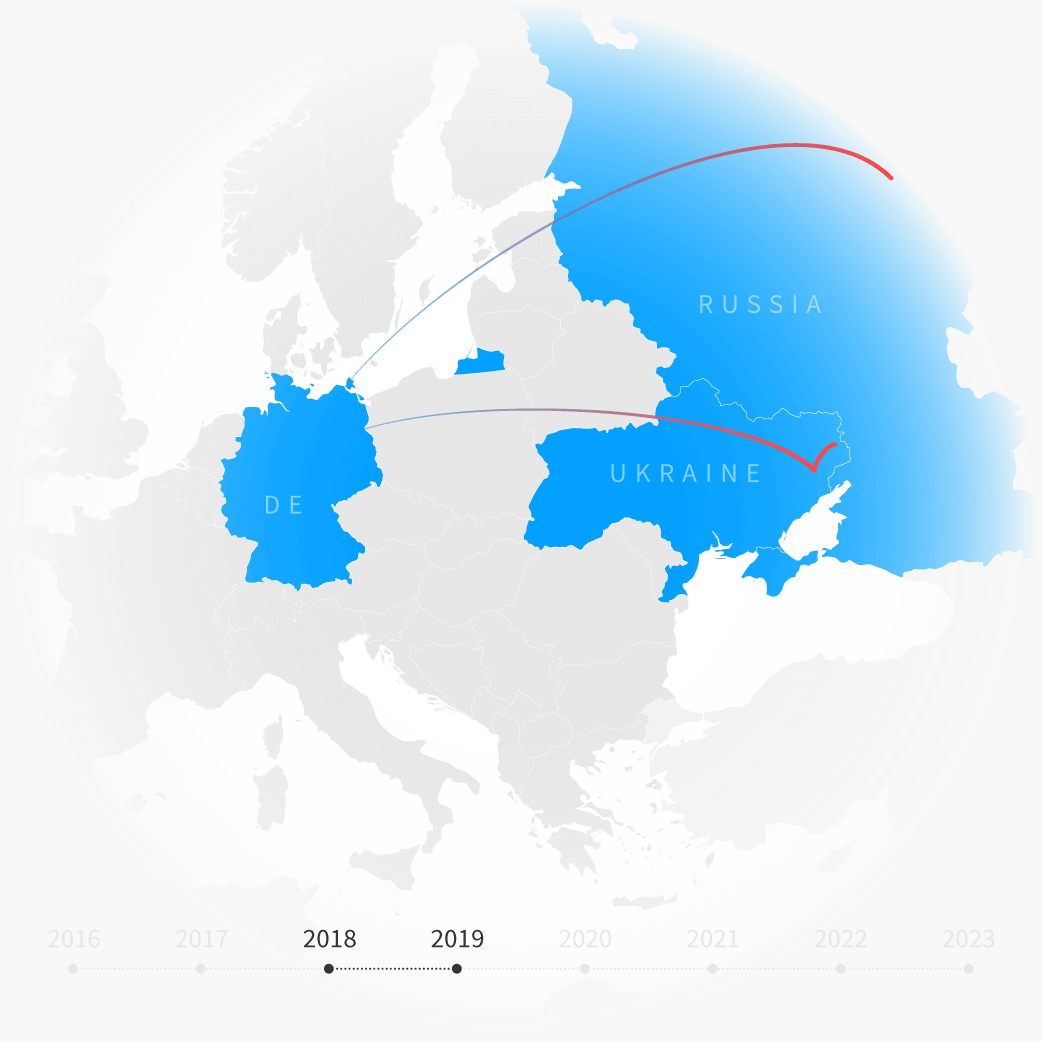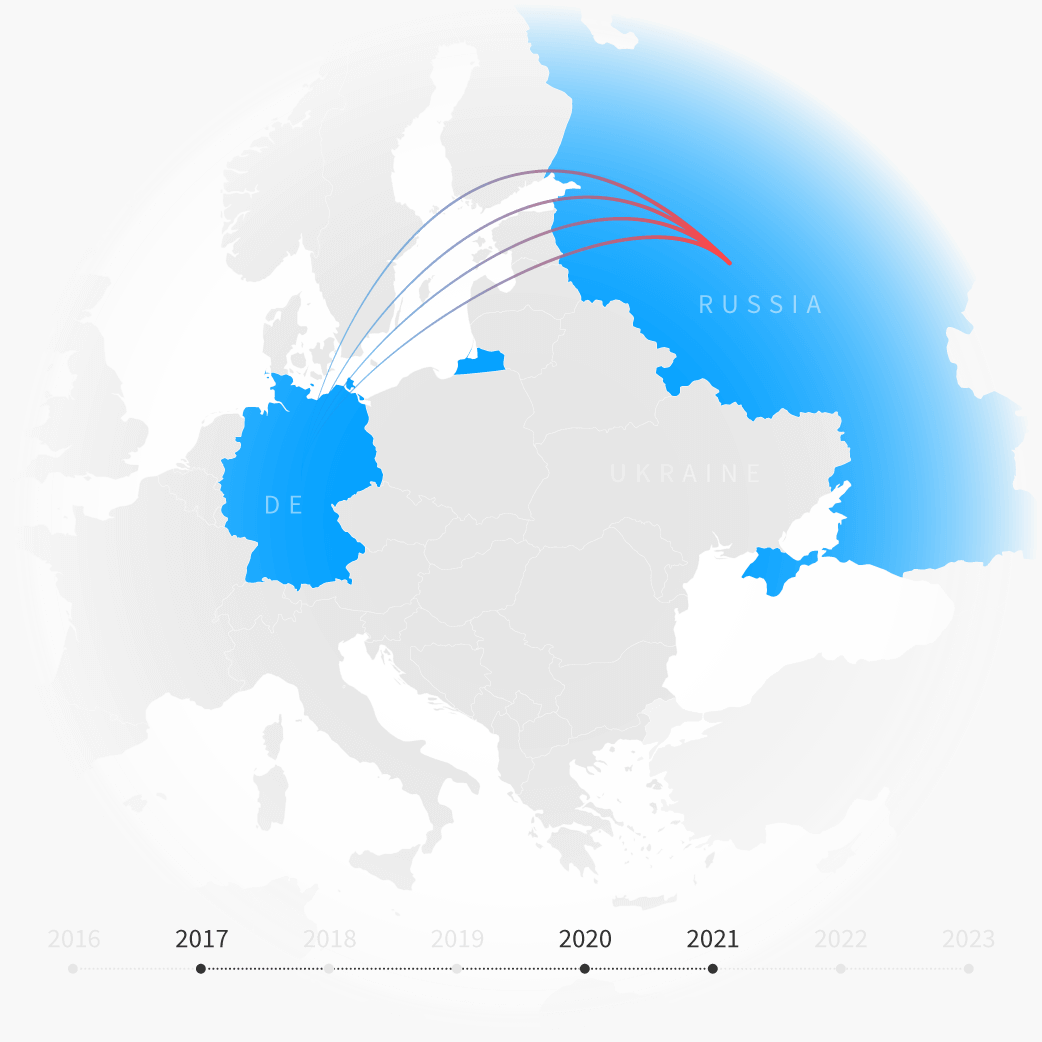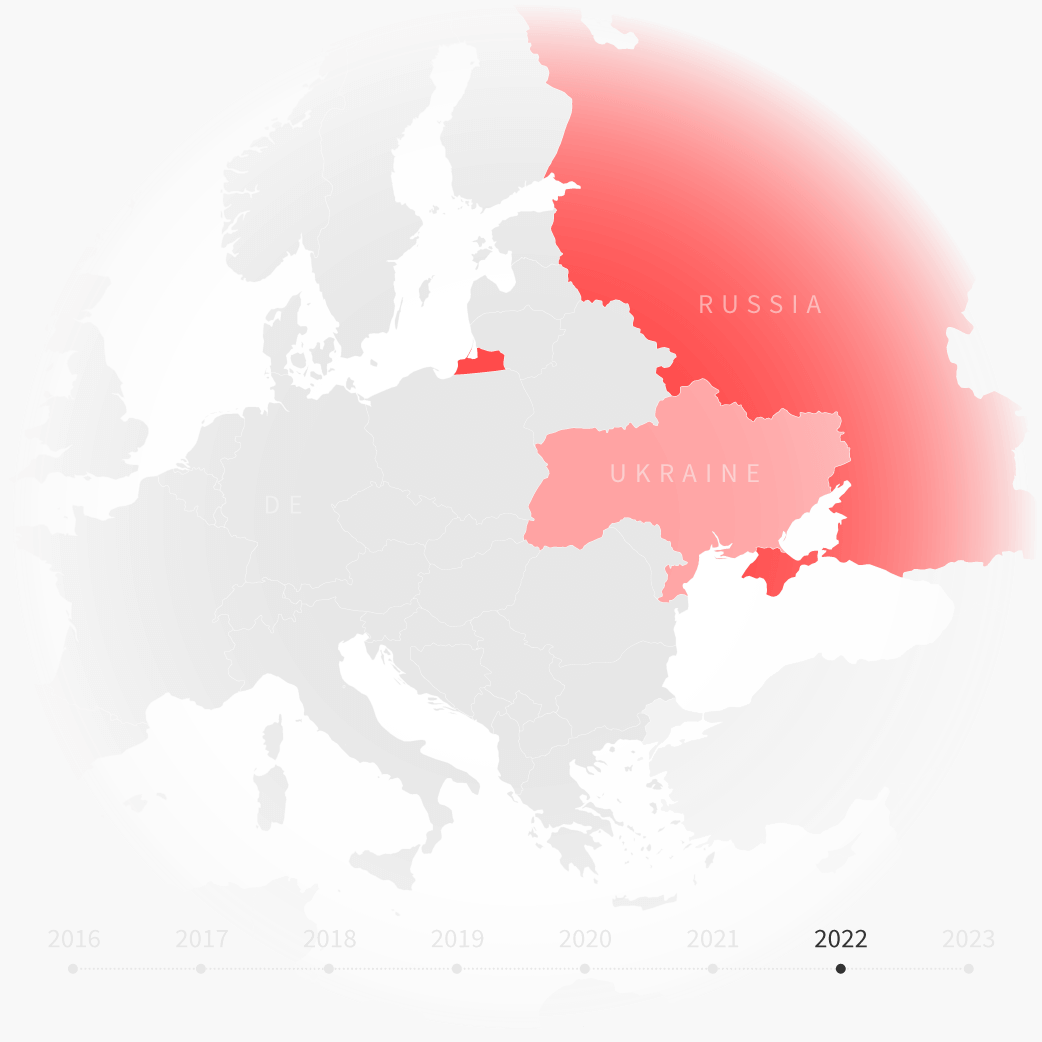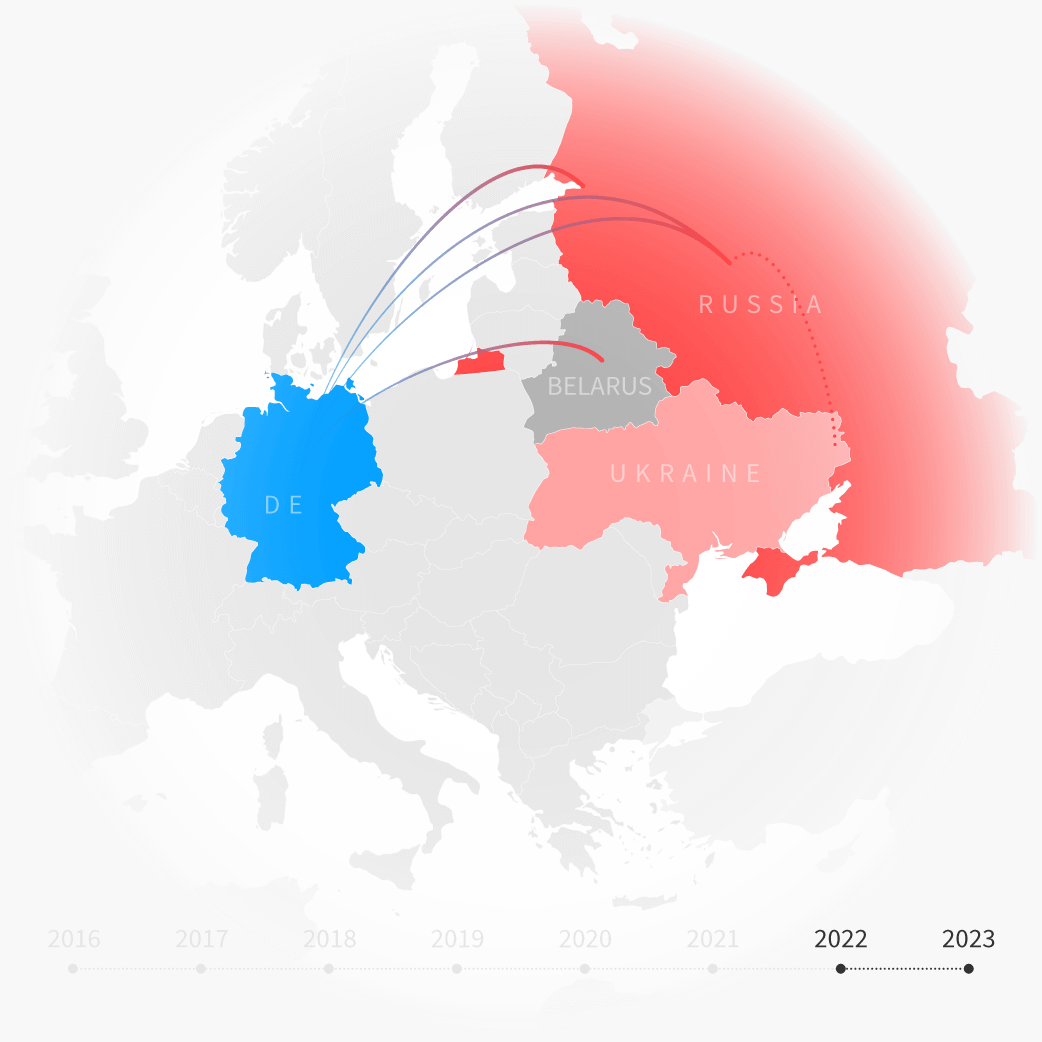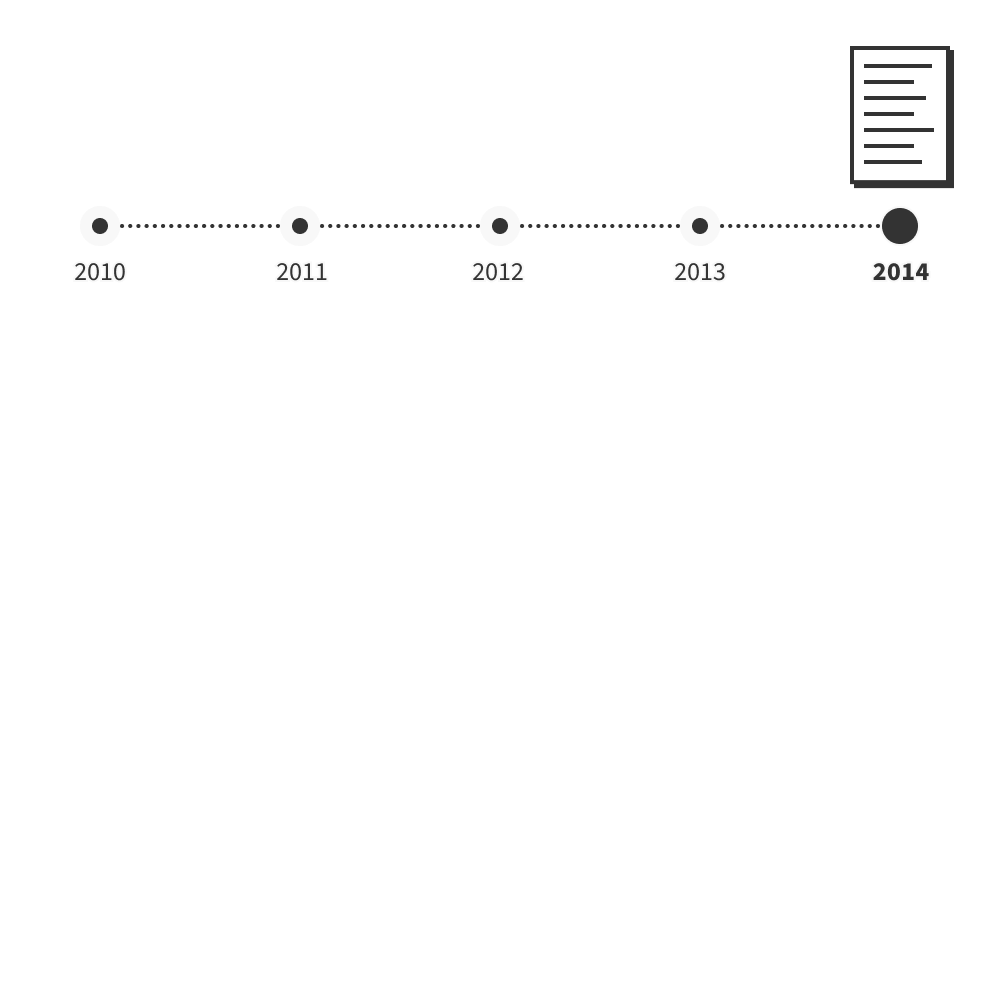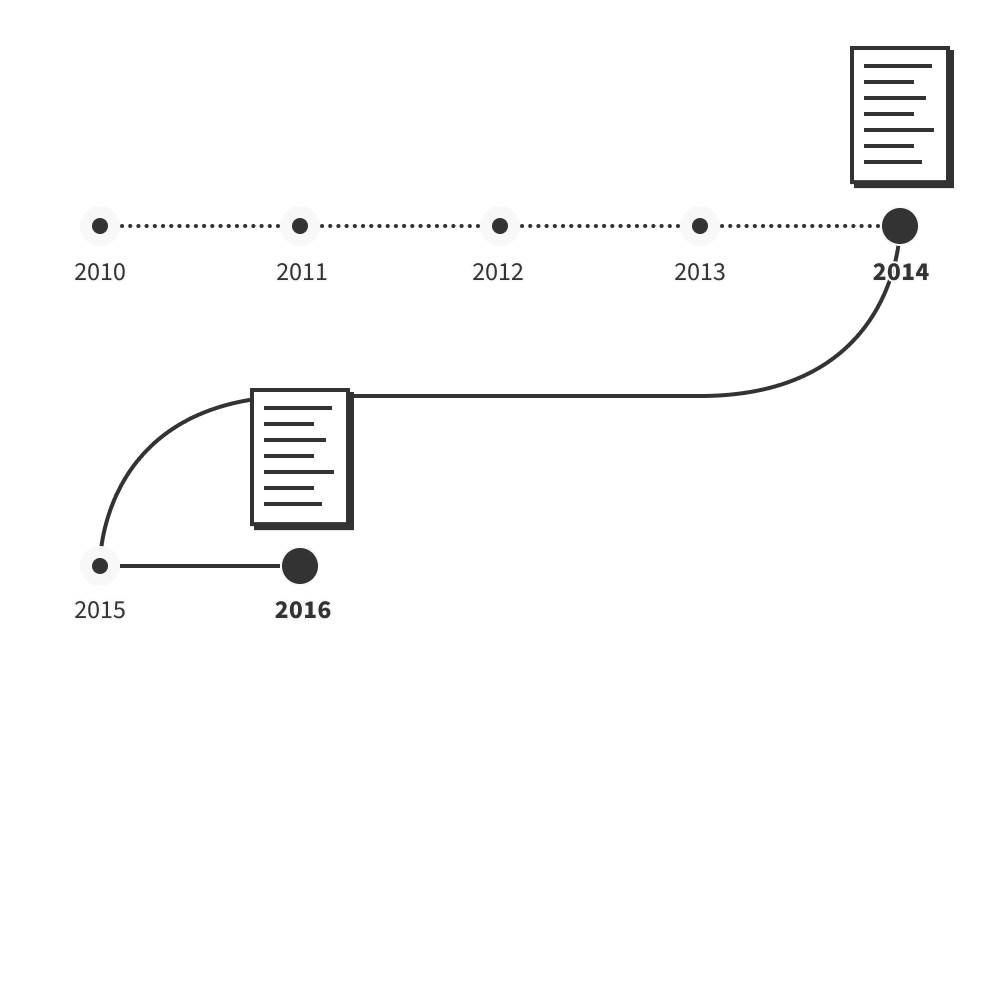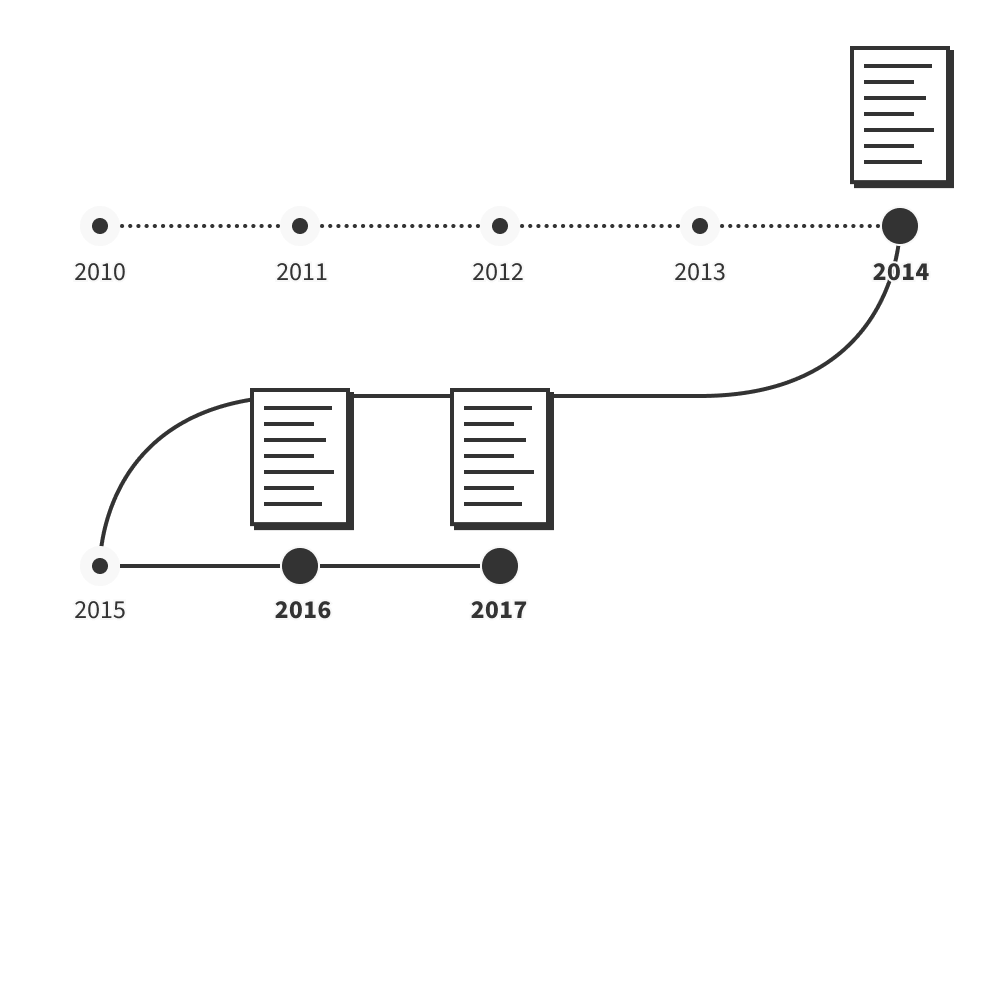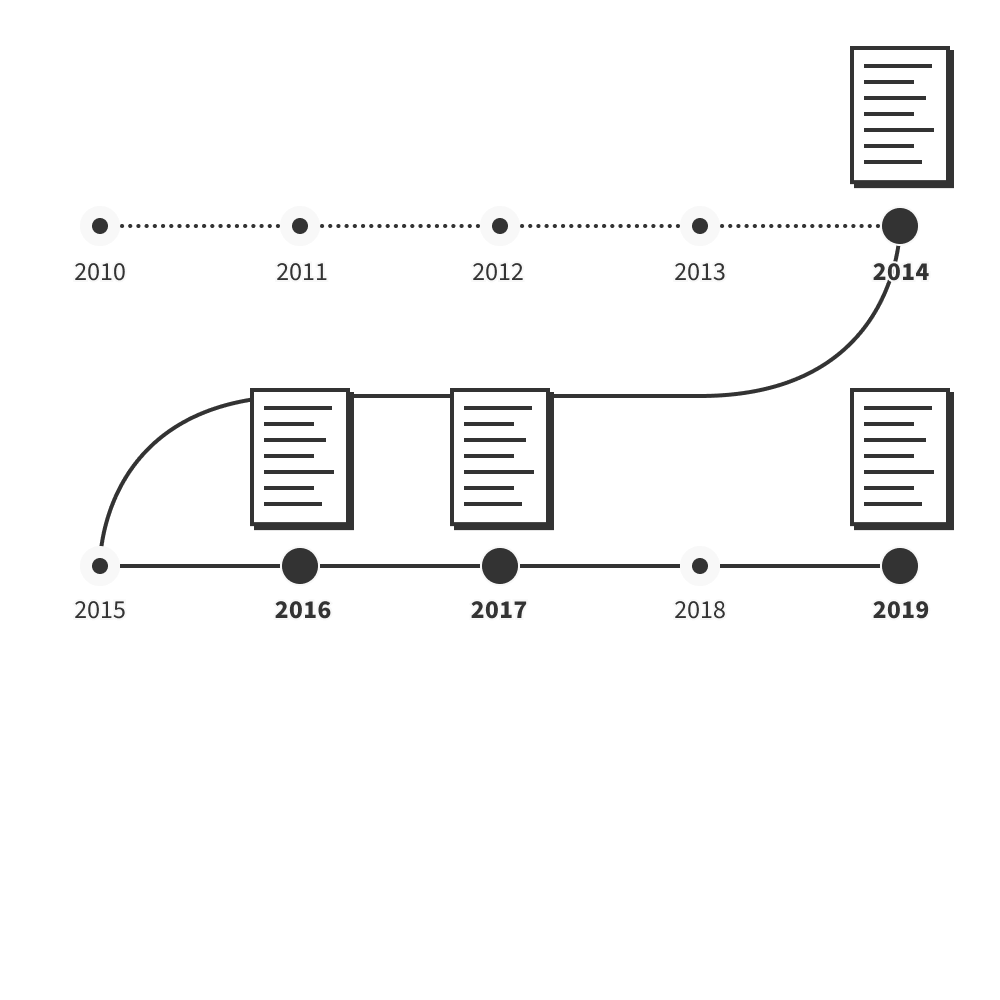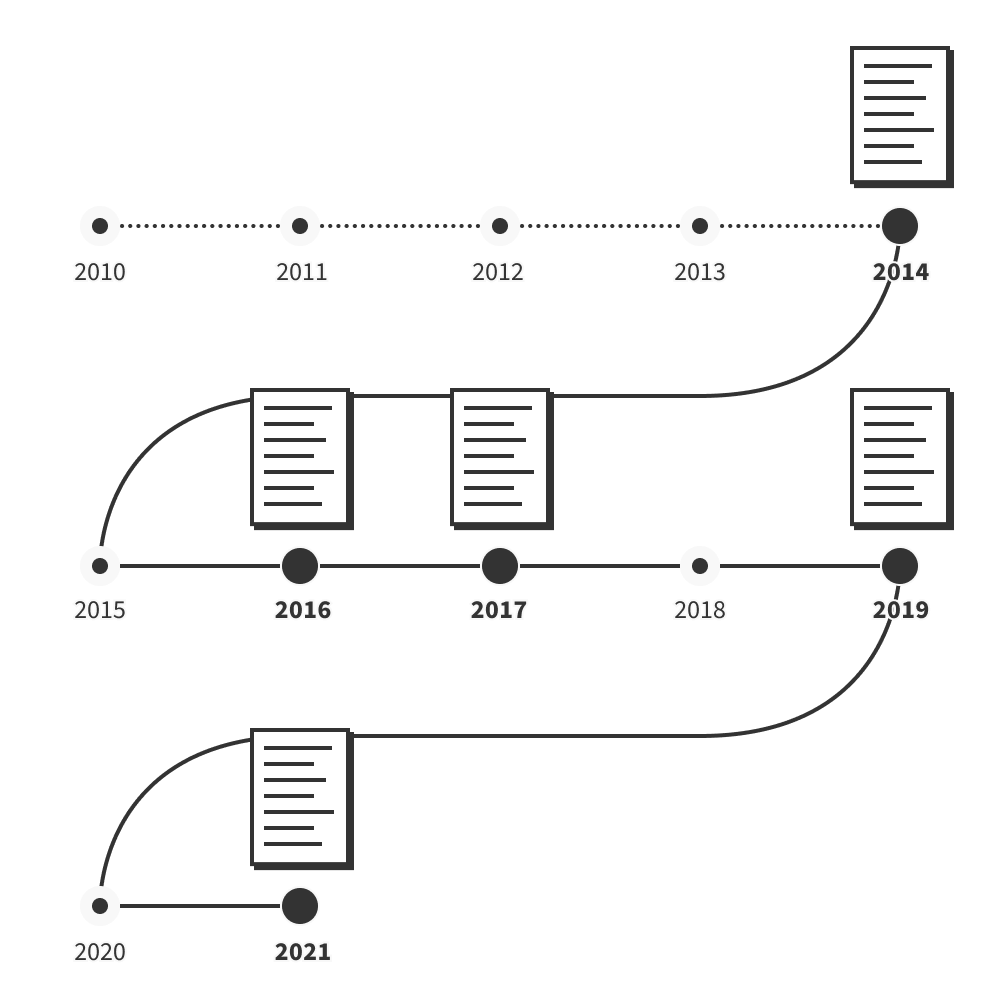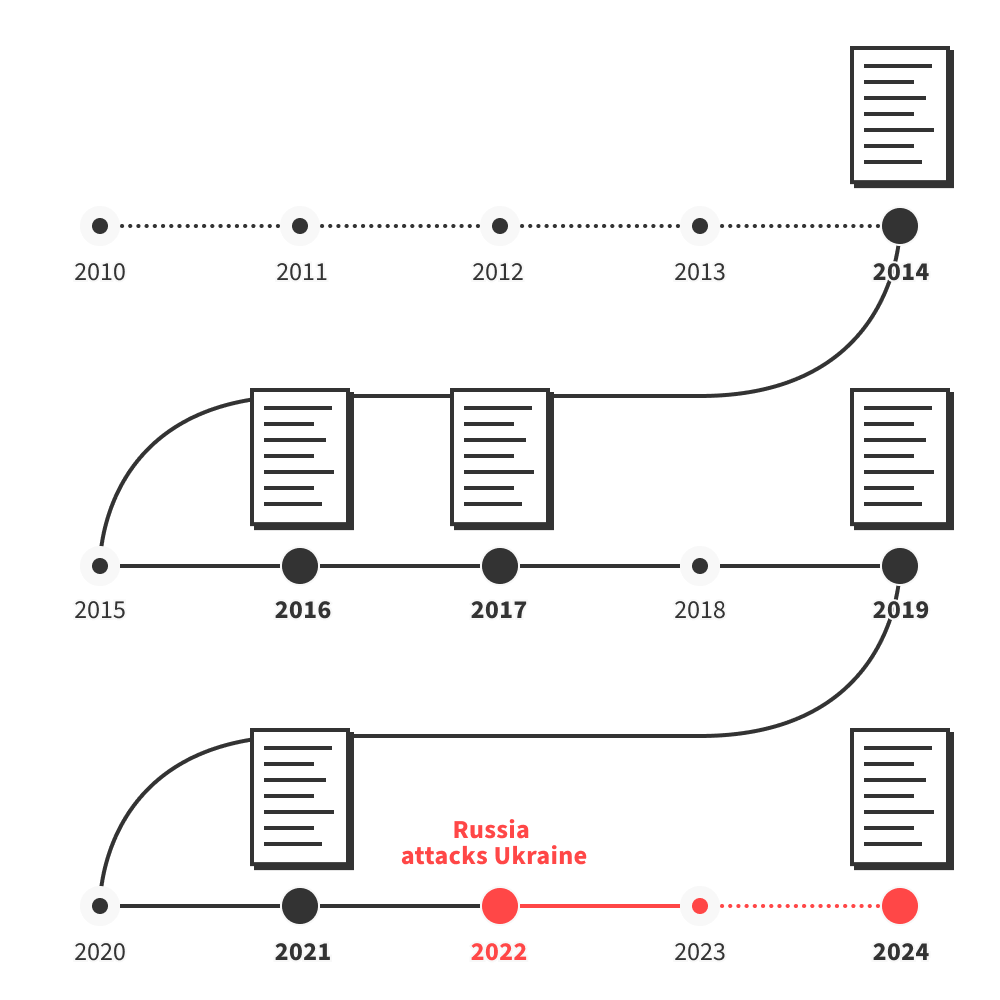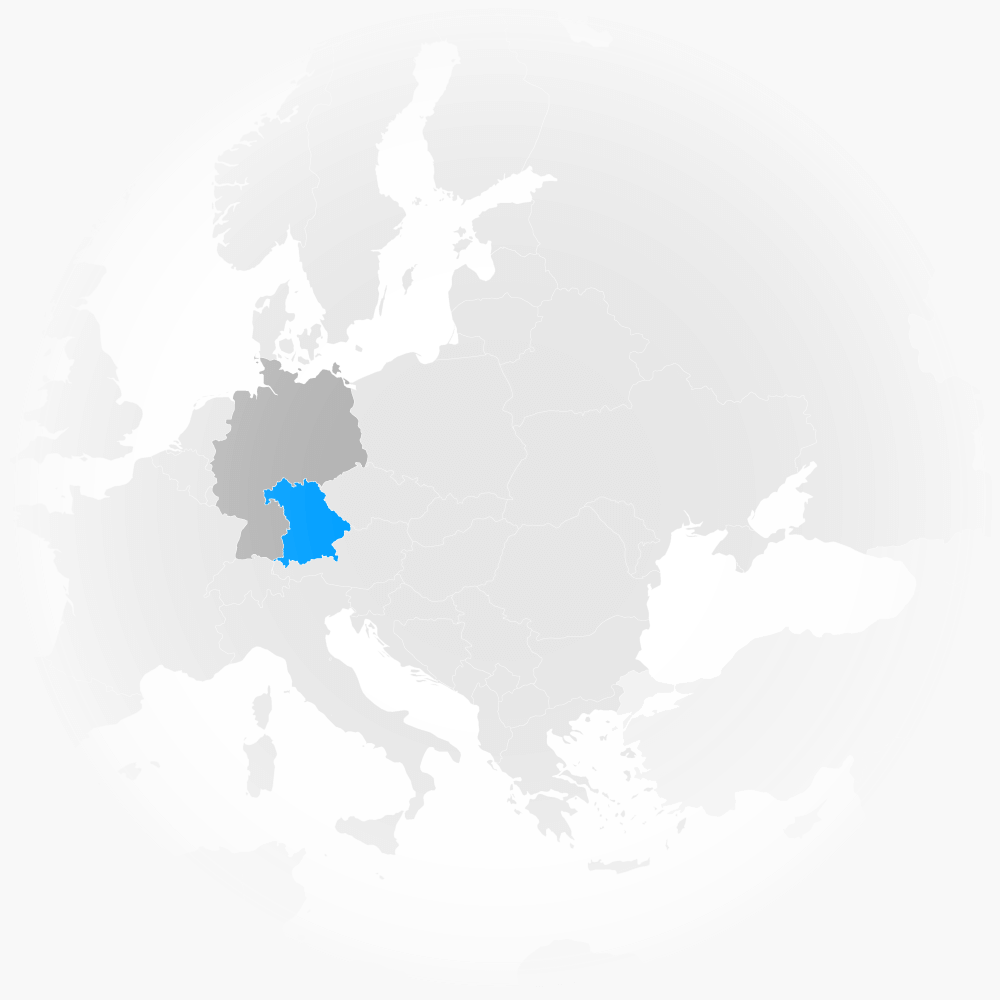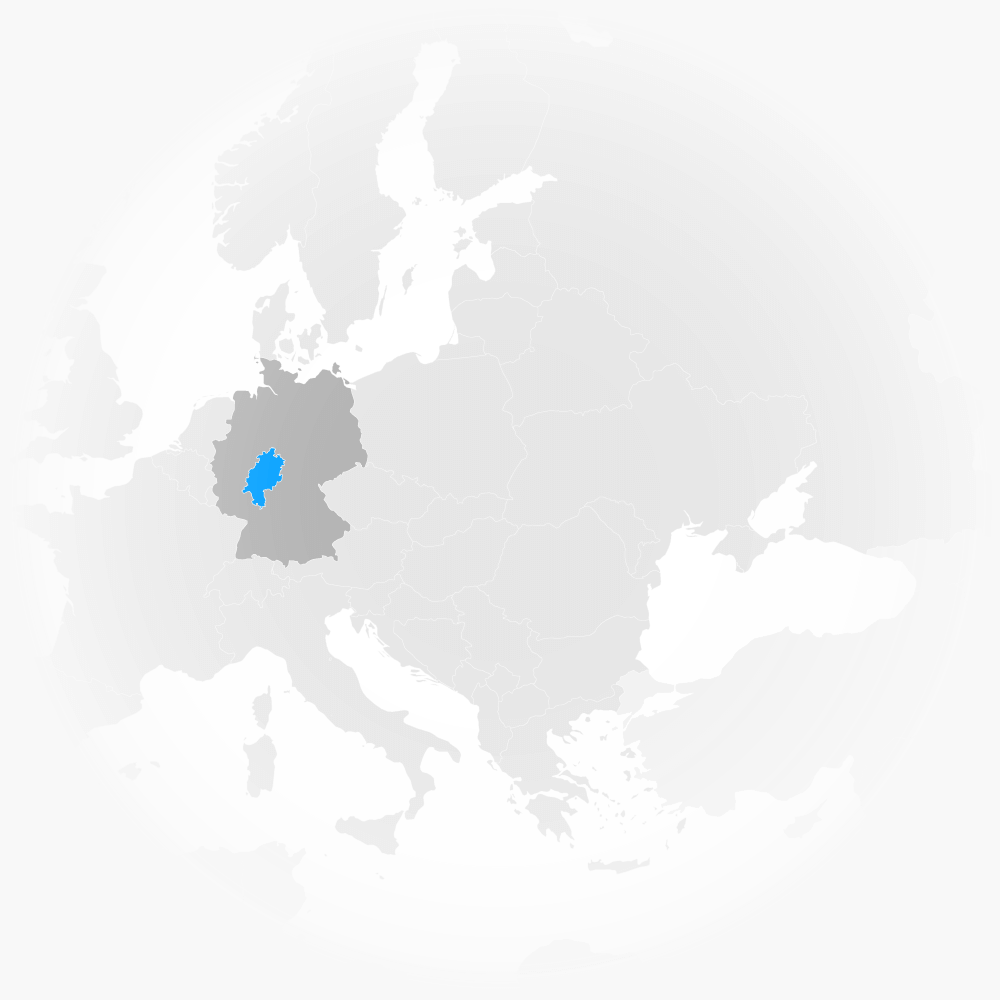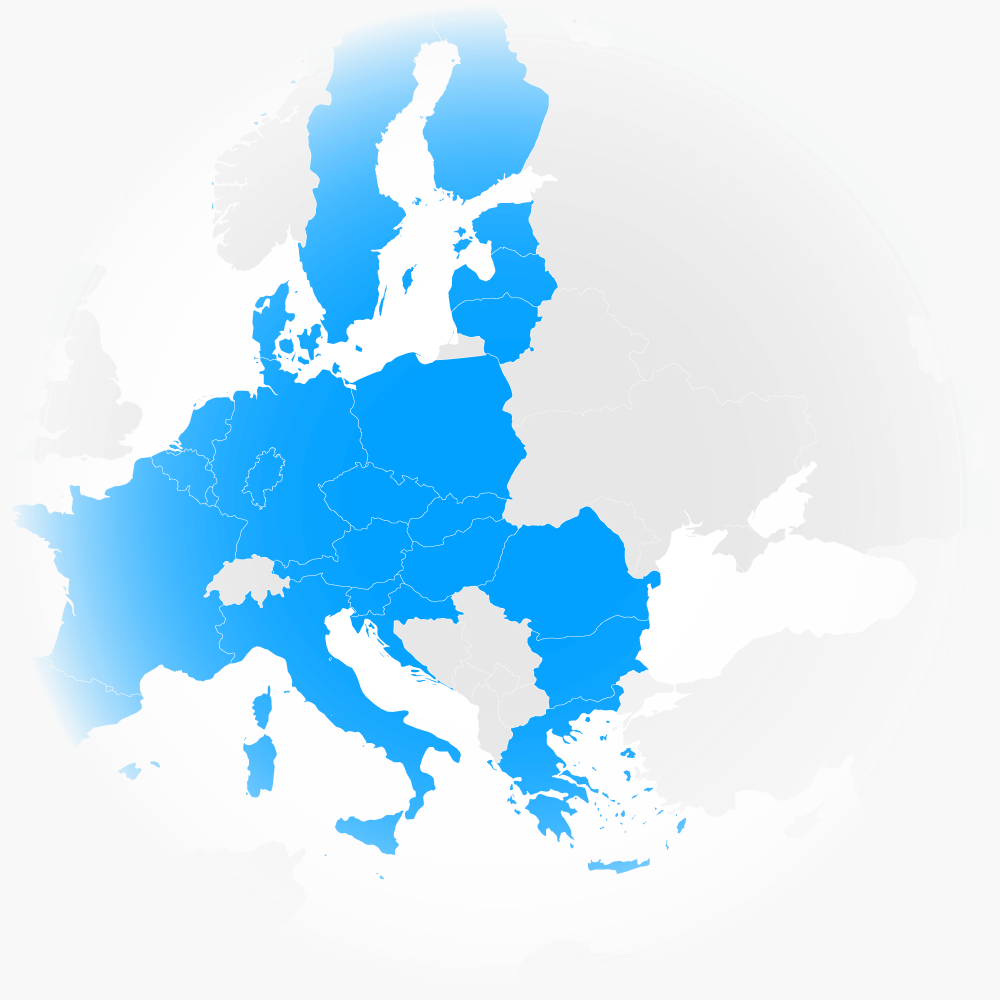If it were up to the Bavarian section of the AfD, the so-called Free State (Freistaat) would break its ties with the West and conduct its own negotiations with the Kremlin. Ukraine shouldn’t receive any weapons from Germany, Ukrainian soldiers certainly shouldn’t be trained on Bavarian soil and all sanctions against Russia should be lifted, they argue. The Bavarian branch of the AfD sees their southern-German state as a part of “Eurasia”, a political slogan used by Russia and increasingly also by the AfD.
For the Bavarian AfD it is clear who is responsible for the war: the USA, and above all its President, Joe Biden.
All this can be found in the “Bavarian Dialogue Initiative for Peace in Europe” (Bayerischen Dialoginitiative für Frieden in Europa), a resolution which the AfD adopted at their regional party conference in May 2023. It wants to see a Bavaria that is:
“a bridge builder between East and West instead of a supporter of Biden’s geopolitics, which are attempting to deliberately divide Eurasia in order to serve US interests.”
Until a few days ago, the “Bavarian Dialogue Initiative” could still be found on the Bavarian branch’s website. We saved a copy from the website which can be found here. After we submitted an enquiry about the page’s removal, the AfD’s regional Bavarian branch stated its pages had been updated for the upcoming election campaign.
No other regional branch of the AfD has ever taken Russia’s side so clearly. The Bavarian AfD called on the Free State of Bavaria to develop its own foreign policy regarding Russia, and to bypass the federal government “by using established channels of communication with long-standing Russian partners.” According to the paper, they would be “following the example of Hungary and Serbia.”
Bavaria is not an isolated case: How the AfD is strengthening ties with Russia
The positioning of the Bavarian AfD branch with regards to Russia seems extreme, but it reflects a more general development in the AfD since its foundation ten years ago. This is not only evident in the well-publicised and provocative trips of AfD politicians to Moscow or Russian-occupied territories – even after Russia’s invasion of Ukraine. A more systematic turn towards Russia is visible in the AfD’s manifestos, motions and speeches in the Bundestag as well as statements made by many of its MPs. CORRECTIV has shown how this closeness to Russia manifests in AfD’s very own words.
Initially, although the AfD spoke out against the EU, the party and its founder Bernd Lucke saw themselves as firmly anchored in the Western community and its values. The AfD’s election manifesto for the 2014 European elections states a clear commitment to NATO:
“NATO is and remains the pillar of the transatlantic security architecture whose key anchor is the alliance with the USA. (…) The AfD affirms the joint pursuit of European interests and thus a common foreign and security policy with the EU.”
10 years later, the word “NATO” did not even make it into the AfD’s main motion for the 2024 European elections. Only with the help of a clever party conference strategy was a fleeting commitment to the Western defence alliance included in the party’s manifesto.
The AfD’s main motion for the 2024 European elections is decisively anti-West. They want to overturn the EU and demand that Germany seek observer status in the “Shanghai Cooperation Organisation,” a club of autocratic regimes dominated by Russia and China. The AfD also wants to cooperate with the Moscow-led “Eurasian Economic Union.” To date, Russia, Armenia, Kazakhstan, Belarus and Kyrgyzstan make up this community. In addition, the Russian nationalists’ concept of the “multipolar world order” made it into the manifesto. In the preamble, the “dominance of non-European great powers” is held responsible for “drawing the states of Europe into conflicts” that are “diametrically opposed to fruitful trade relations in the European-Asian area.” The “dominance of non-European great powers” presumably refers the US.
The AfD’s shift towards Russia is a break with Germany’s links to the West
Such a U-turn in a party’s foreign policy is unique in German party history. Never before has a political party, which to this day describes itself as bürgerlich (a German term that associates a party with both the middle-class and with democratic and social norms), turned away from its ties to the West and oriented its foreign policy towards Moscow.
One of the AfD’s founding myths is that it is essentially a version of the CDU/CSU (Germany’s centre-right Christian democratic party) of the 1980s. With its orientation towards the East, however, the AfD’s position stands in stark contrast the party of Konrad Adenauer, Franz-Josef Strauß and Helmut Kohl. For the CDU, transatlantic relations, Germany’s integration into NATO and the European Union are essential foundations of its foreign policy.
Before Russia’s invasion of Ukraine, the policy of rapprochement with Russia was a goal shared by all the main German political parties (SPD, CDU/CSU and the FDP), despite the annexation of Crimea in 2014. They were overwhelmingly in favour of the Nord Stream gas pipeline from Russia to Germany. Following the idea of “change through trade,” the parties had been hoping for a successful policy of détente with Russia for a long time.
The Russian invasion of Ukraine put paid to the assumption that trading partners do not wage war with each other. The CDU/CSU, the SPD, the Greens and the FDP are now overwhelmingly united in their support for Ukraine and the isolation of Russia in the war.
The AfD did not share in this change of heart, instead strengthening their rapprochement with Russia. Here the AfD also differs from other right-wing parties in Europe, such as in Finland, Sweden, or Italy. The Italian Prime Minister Giorgia Meloni, for example, has clearly sided with Ukraine.
Various German media outlets such as the Spiegel, ARD, SZ, Welt, ZDF Frontal and t-online as well as CORRECTIV have already published findings on the AfD’s connections with Russia. Based on manifestos, trips, quotes and speeches, the AfD’s systematic shift towards Russia is now becoming very visible.
The party has become the Alternative for Russia.
The many trips made by AfD MPs to Russia are conspicuous. Many are intended as deliberate provocations, such as a trip to Crimea, which had just been annexed by Russia, or to the separatist areas in Luhansk and Donetsk, which are under Russian occupation. The AfD politicians involved sought proximity to the Putin regime during these trips; some took part in Russian-organised election monitoring. Rather than criticising the repression of the opposition and the restrictions on press freedom, one MP even praised the elections as “free, equal and secret.” The German newspaper Die Welt uncovered over 100 such trips in October 2021 alone.
Even after the Russian invasion of Ukraine, AfD politicians continued to travel to Russia. They called for the lifting of sanctions against Russia and did not speak out against Russia's war of aggression. Here we have detailed a selection of these trips and how they demonstrate a systematic rapprochement with Russia.
AfD politicians who travelled to Russia: Three examples
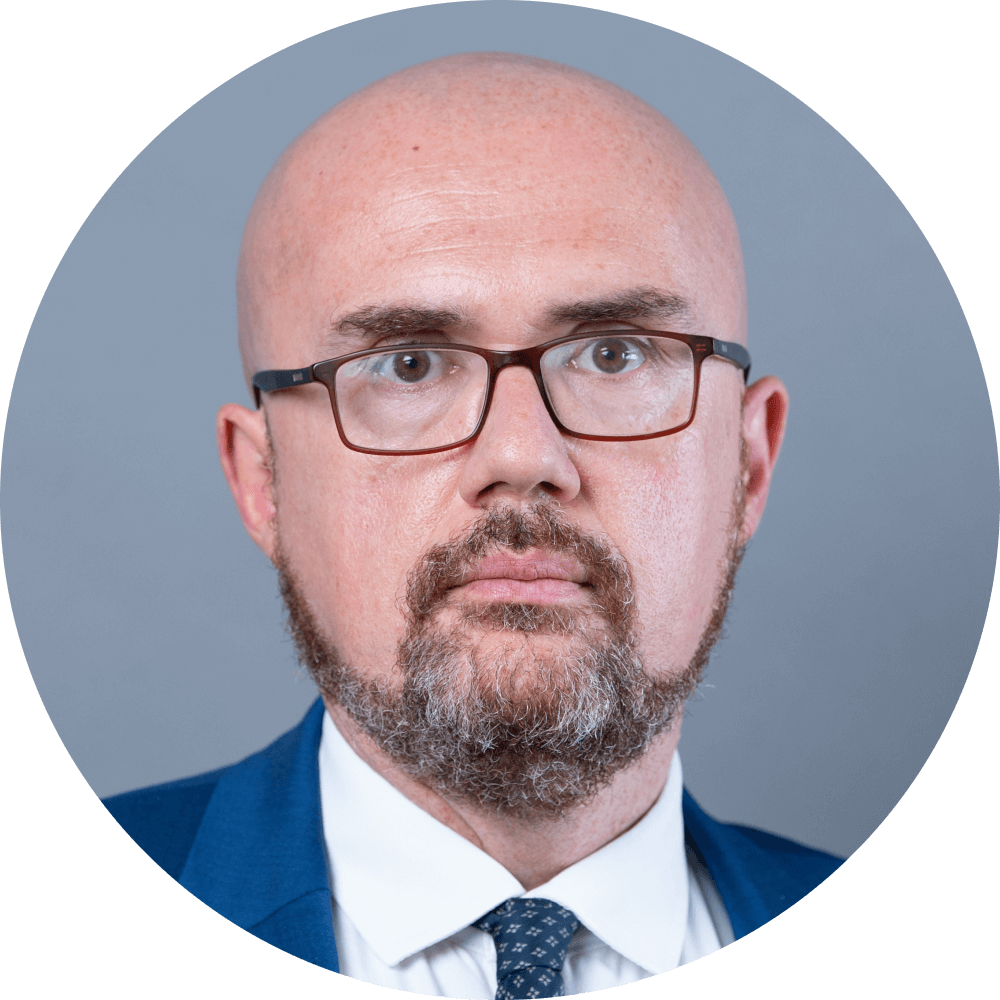
The provocateur:
Hans-Thomas Tillschneider
Hans-Thomas Tillschneider, member of the regional parliament for Saxony-Anhalt, doesn’t hide his admiration for Russia even during war. Shortly after the Russian invasion of Ukraine, Tillschneider released a post on Facebook saying, “Russia attacks, writes the Tagesschau. Wrong. Russia is defending itself!”. The post was later deleted. In September 2022, Tillschneider travelled to Russia along with fellow Saxony-Anhalt parliament member Daniel Wald and Christian Bex of North Rhine-Westphalia’s parliament. That alone was highly controversial after the invasion of Ukraine. The AfD’s national executive committee stopped them from continuing on to the Russian-occupied Ukrainian provinces of Donetsk and Luhansk, but this did not put a stop to Tillschneider’s further regular trips to Russia. Making his stance clear in another Facebook post, he wrote: “Transatlanticists against Eurasians! We have to rethink.” In August 2022, he attended a security conference in Moscow where he railed against the “rainbow empire”. Tillschneider sees Putin’s Russia as an ally in the fight against the politics of equality and sexual self-determination. Russian propaganda, since the war particularly, has denounced Europe as “gay Europe” and “Satan's empire.” The war against Ukraine is seen as a “crusade.”
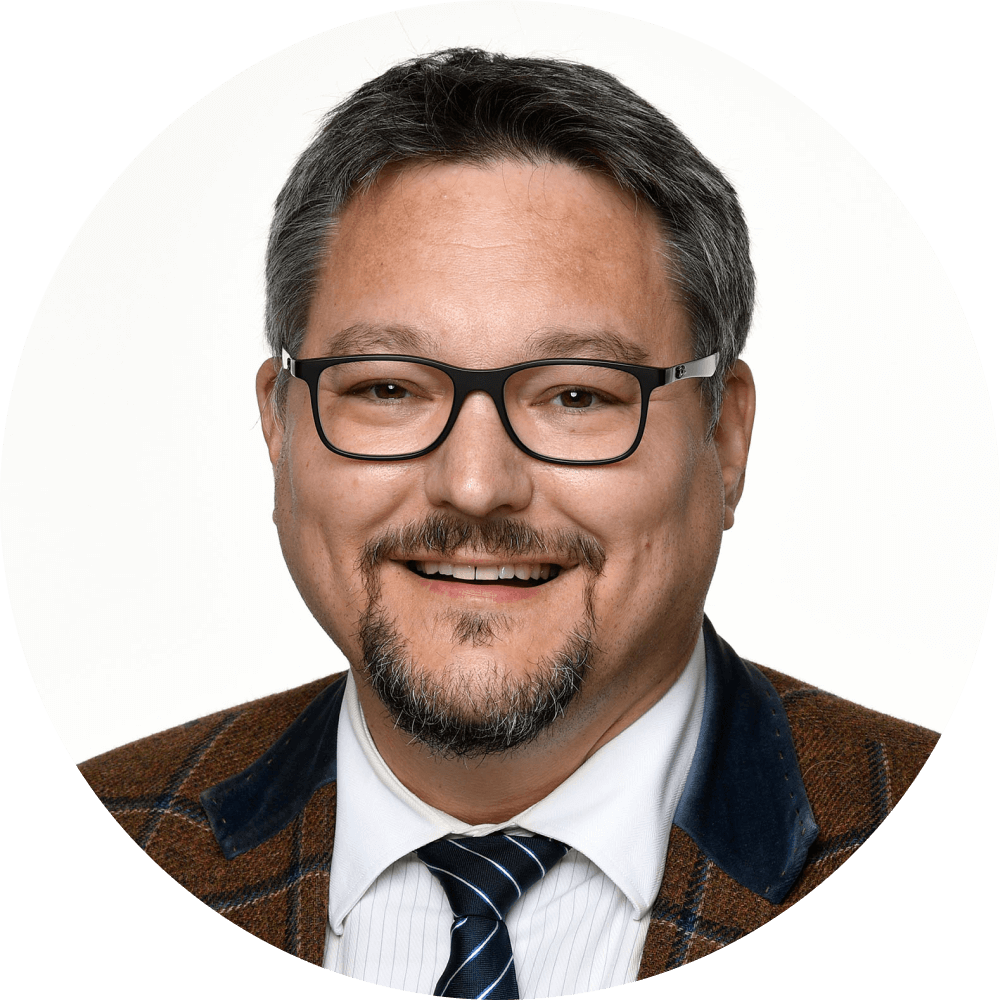
The electoral observer:
Stefan Keuter
Stefan Keuter is an AfD MP from Essen. Before Keuter came to the Bundestag, he had little to do with Russia. He had only visited the Russian capital once 20 years ago, he wrote. In 2017, Keuter entered the Bundestag for the AfD on one of the back seats of the North Rhine-Westphalia state list. As soon as he entered the German parliament, Keuter looked to get closer with Russia. His posts on Facebook show this. He attended receptions at the Russian embassy, and in 2018 took part in the Russian-organised observation of the presidential elections. Keuter praised Putin’s Russia in Russian media. In a report published on Facebook, he wrote that “the population here believes that Putin is good for Russia and works on behalf of the people, as well as representing national interests.” In Keuter's view, the elections were “free, equal and secret.” More trips followed, even after the Russian invasion of Ukraine. Keuter took part in the Moscow conference “Economy against Sanctions” online in April 2022. As reported by the ARD, he used the conference to criticize the sanctions against Russia and accused the German media of “propaganda.” Russian media also seized on a speech Keuter made in the Bundestag where he declared: “This is not our war.”
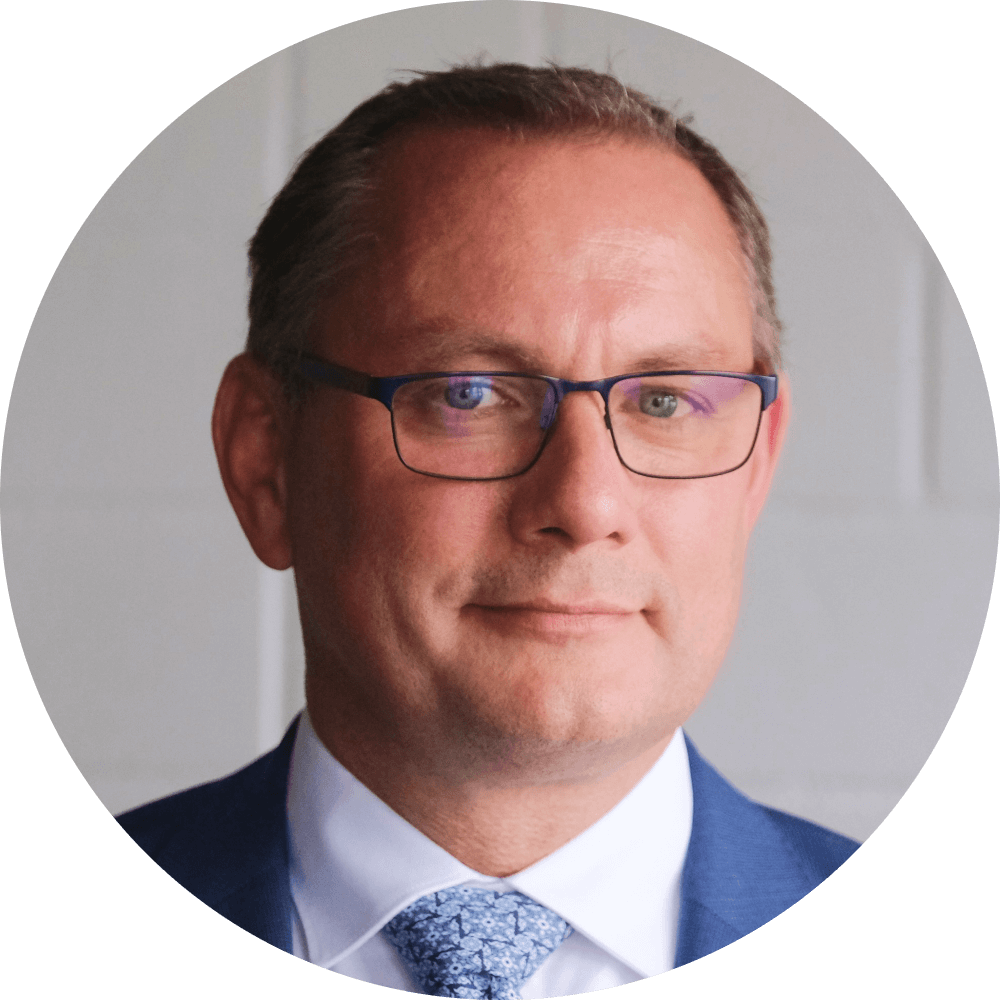
The uncritical guest:
Tino Chrupalla
The AfD national chair Tino Chrupalla travelled to Moscow twice before the start of the Russian war of aggression against Ukraine. In December 2020, he met Russian Foreign Minister Sergey Lavrov. Shortly before that, German Chancellor Angela Merkel had visited the poisoned Russian opposition politician Alexei Nawalny at the Charité in Berlin. Observers see the reception of the AfD politician as a retaliation by Russia in response. Six months later, Chrupalla travelled to Moscow again to attend a Russian Ministry of Defence conference. At the time, Russia was amassing troops on the Ukrainian border. Chrupalla expressed no criticism of Russia’s actions, but instead advocated dropping the sanctions against Russia.
Enthusiasm for Russia, for the Russian President Vladimir Putin, and also for the ideologically charged terms “Eurasia” and “multipolar world” is widespread amongst AfD members. Here we present a small selection of them.
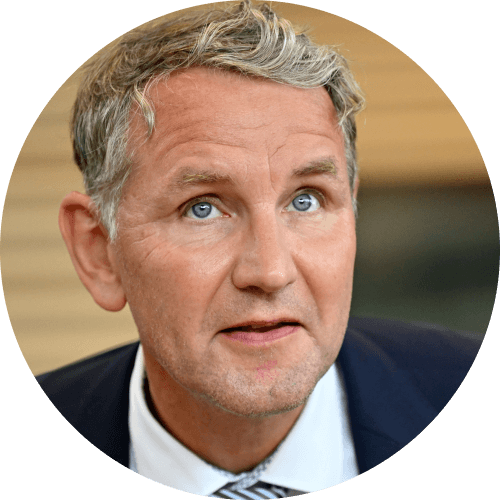
The right-wing ideologue:
Björn Höcke
Björn Höcke leads the Thuringia branch of the AfD as well as its parliamentary group. He is considered the AfD's populist ideologue and a string-puller within the party. Since the 2022 party congress in Riesa, Saxony, he has consolidated his power within the party. Although Höcke himself did not run for the national executive committee, he told ZDF that the newly elected executive committee was “so far completely to my taste.” Former AfD leaders Lucke, Petry and Meuthen failed to throw Höcke out of the party despite his links to Nazism, instead leaving the party themselves. Höcke can officially be described as “fascist” under press laws. His radicalisation to the right goes hand in hand with a shift towards Russia and the nationalist, anti-Western ideology of the Russian philosopher Alexander Dugin. During a speech on German Unity Day in Gera in 2022, he said:
“The US government has ordered the German government to commit economic suicide and Scholz and his cronies are carrying out the order. Dear friends, I don't think it's going too far to state the following: it was and is US strategy as a foreign power to drive wedges into our continent, to drive wedges between nations that could actually work very well together.”
“Our natural partner, the natural partner for us, the nation of tinkerers and thinkers, the natural partner for our way of working and living, would be Russia; a country with almost inexhaustible resources.”
“If I had to choose now for the German people between the ‘rainbow empire’, between the new West, between the globalist West and the traditional East, I would choose the East in this situation.”
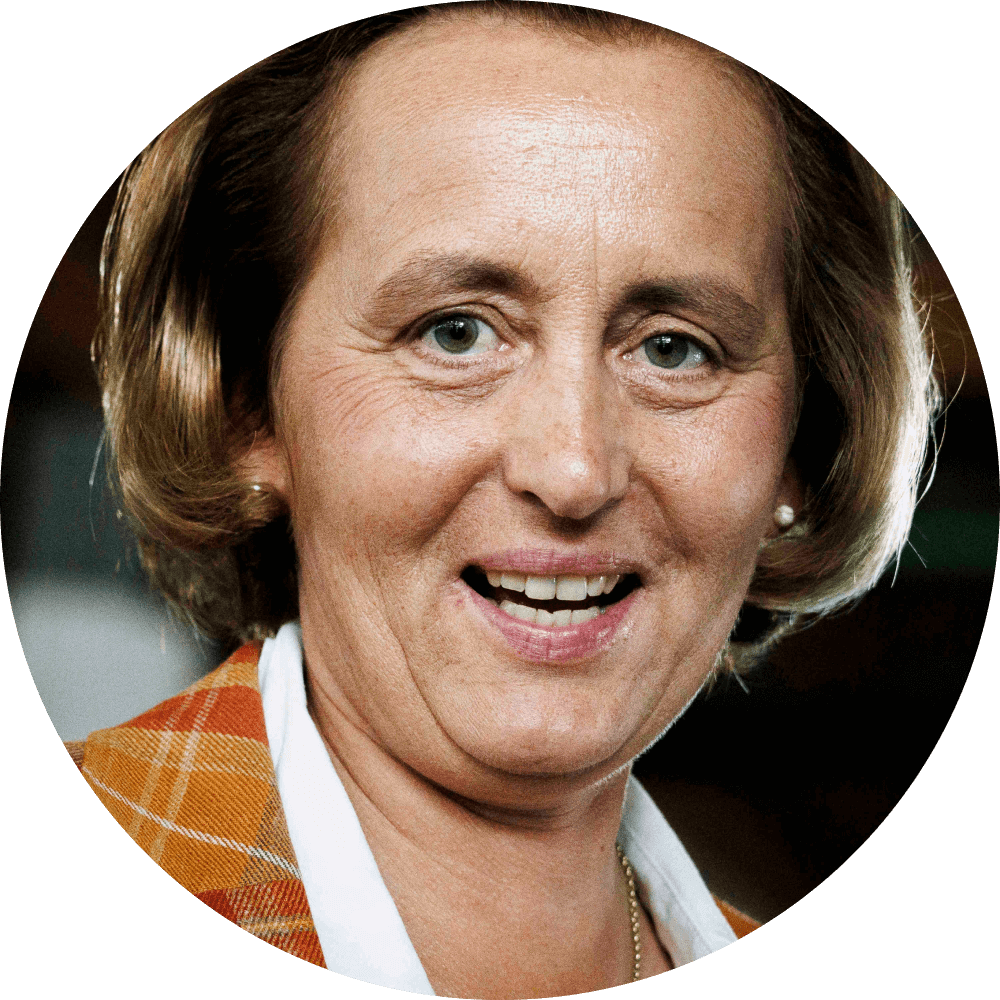
The ideology importer:
Beatrix von Storch
After the Russian invasion of Ukraine, AfD politician Beatrix von Storch has been reticent to make a public statement. Before the war, von Storch was more explicit. In a tweet from November 2019 she said:
“(…) Against #NATO with Putin. Germany is isolated thanks to #Merkel. Moral convictions lead to a dead end. Venture more realism.”
Before von Storch became involved in the AfD, she and her husband ran a number of organisations opposing abortion and the right of sexual self-determination. Along with other right-wing, fundamentalist Christians she is also behind the “Demo für Alle” (Demonstration for Everybody) rallies, which protest against abortion, freedom of sexual identity and same-sex marriage. The Russian oligarch Konstantin Malofeyev plays a significant role in this context. He sees Russia as a bulwark against an alleged moral decline in Europe. Like the philosopher Alexander Dugin, the ultranationalist oligarch appears again and again in AfD circles. Von Storch did not answer CORRECTIV's questions about the “Demo für Alle” or about Malofeyev.
The Hamburg Higher Regional Court (Oberlandesgericht) ruled on Malofeyev's links to the “Demo für Alle” in November 2022 that:
“The allegation that Konstantin Malofeyev organised protests such as the “Demo für Alle” was lawfully disseminated thereafter. This is because he gave the €75,000.00 in question after the …so that the founder of the CitizenGO platform Ignacio Arsuaga could set it up for the organisation and publicity of the protests.”
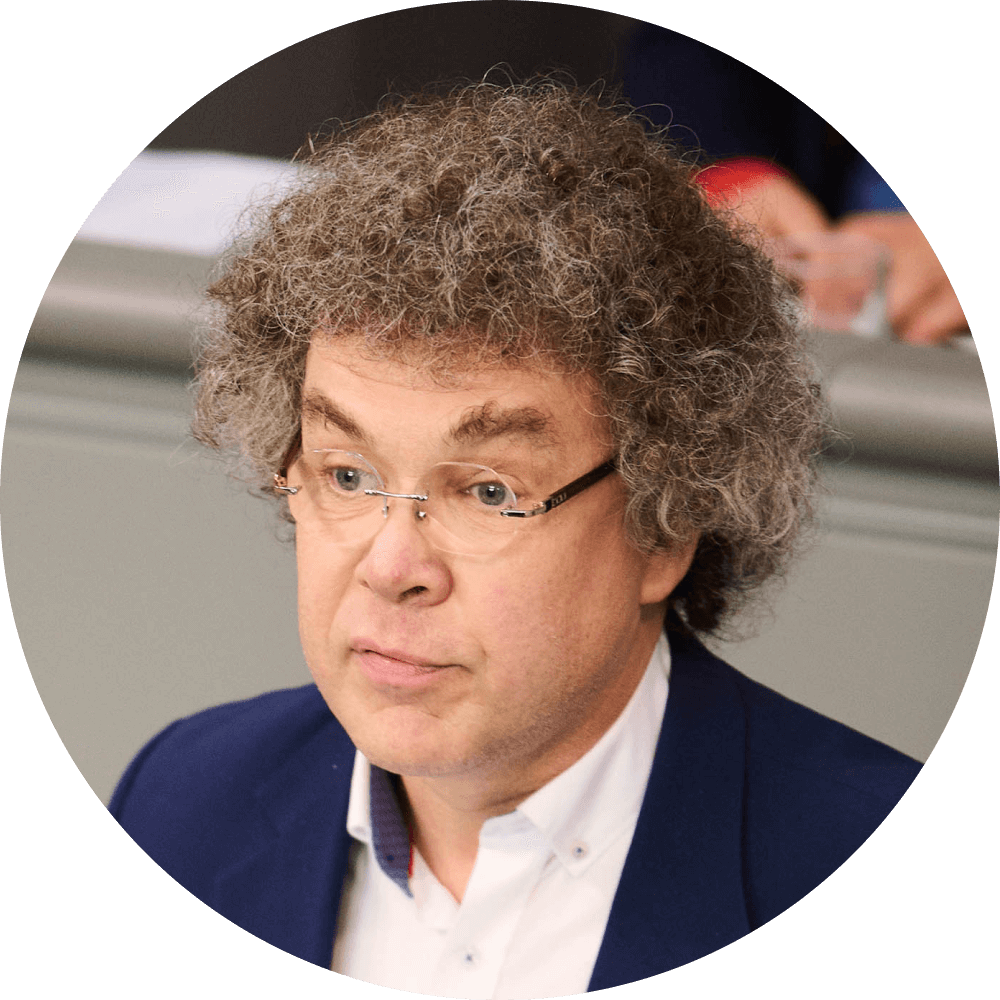
The complicit helper:
Matthias Moosdorf
Matthias Moosdorf from Saxony has been an MP in the Bundestag since 2021. In particular since the Russian invasion of Ukraine he has represented pro-Russian positions as a member of the inner-party working group “Foreign Countries” (Ausland). He organised a “peace concert” in the Bundestag when the AfD parliamentary group introduced a so-called “peace initiative” in the Bundestag at the beginning of February, which was rejected by the overwhelming majority of MPs because it pandered to Russian interests. Moosdorf blames the West and especially the USA for the war. In May 2023, he visited an economic forum in St Petersburg, the Russian president's home town. The Russian government used the visit of these western supporters to prove to its own population that Russia was not isolated, and Russian media reported on the AfD MP's visit. Moosdorf repeated Russia's claims of having a right to Central and Eastern Europe states, criticising NATO’s protection of the Baltic states:
“There will be [no peace] without correcting the mistakes made with NATO’s expansion to the exclusion of Russia.”
Bundestag, 9 February 2023
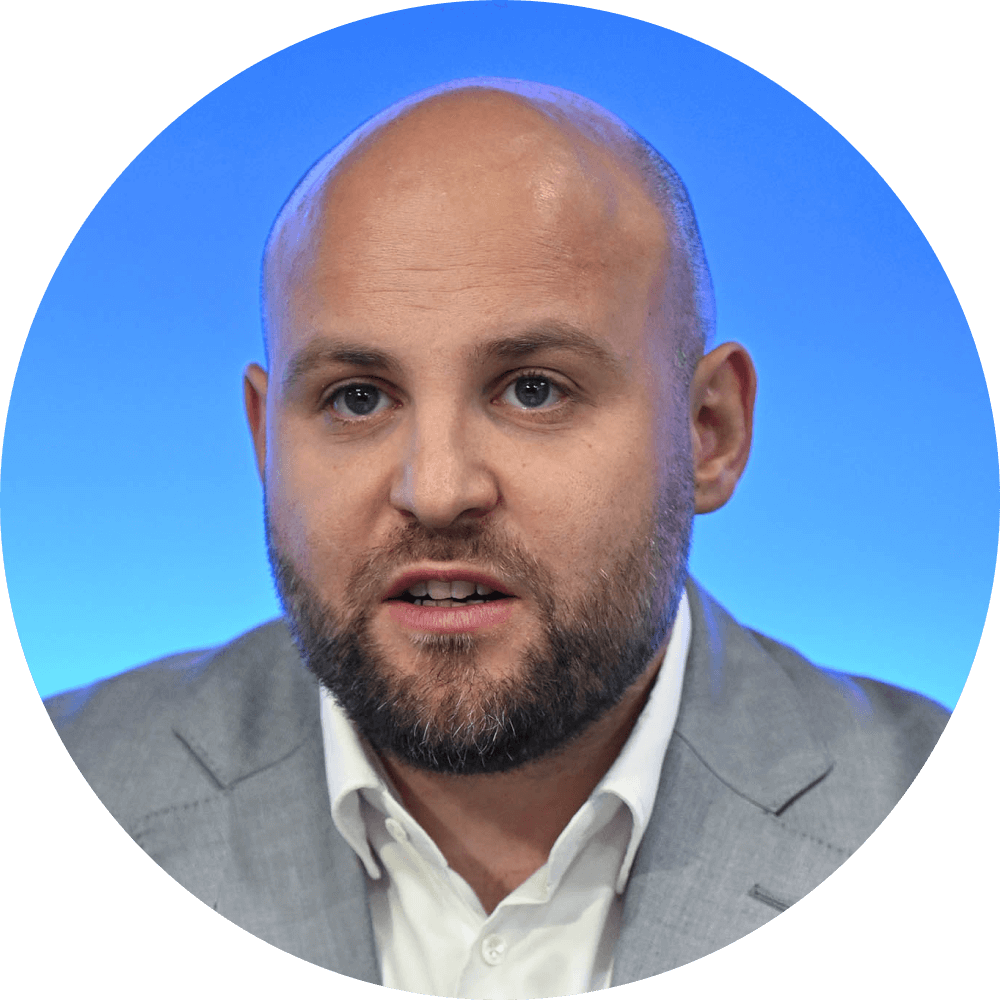
An MP “who belongs to us”:
Markus Frohnmaier
The former chair of the AfD’s youth wing Junge Alternative, Markus Frohnmaier, accompanied the former AfD MEP Marcus Pretzell to Crimea in 2016. Early on he made contact with the neo-Nazi Manuel Ochsenreiter, who often referenced the Russian nationalist philosopher Alexander Dugin. When Frohnmaier entered the Bundestag, he employed Ochsenreiter as an adviser. Only when the German public prosecutor's office investigated Ochsenreiter for a terrorist attack in Ukraine did Frohnmaier reluctantly dismiss him. In an email from an employee of the Russian Duma to the presidential administration in the Kremlin, as quoted in a Frontal article, says:"In the Bundestag, there will be a deputy who belongs to us and whom we have absolutely under control." Frohnmaier denied dependence on Russia to Frontal and Spiegel. In a September 2023 Bundestag debate, Frohnmaier attacked the German government over aid to Ukraine:
“And I have to ask, Mr Habeck, are you actually the German Business Secretary or the Business Secretary for Ukraine? Do you actually represent German interests or do you represent the interests of foreign countries? The citizens of Germany know the answer. This government, Bandera and Baerbock, Volodymyr and Habeck, these foreign administrators, they don't give a damn about Germany.”
In speeches, social media statements, interviews and manifestos, statements and theses can be found that clearly show the AfD’s rapprochement with Russia and their alienation with the West. Certain themes recur again and again:
The USA is responsible
“Ukraine is as much a loser in this war as Russia. There is only one winner, and that winner is the USA.”
Tino Chrupalla in the Bundestag on 2 March 2023
The war is terrible, but it is none of Germany's business
“What it ultimately means for Ukraine and for Russia and for territorial division is not our problem at all,” Weidel said. “We have to look after our own country.”
Alice Weidel on Deutschlandfunk on 6 April 2022
Peace should be established, but at the expense of Ukraine
“We oppose economic sanctions against Russia and favour the resumption of low-cost and environmentally friendly gas supplies. We oppose a supply of arms to Ukraine.”
Quote from the Bavarian AfD’s regional election campaign flyer
The Nord Stream pipeline should be reinstated
“The Nord Stream pipeline remains an important part of German energy security.”
Tino Chrupalla on 4 October 2022
The concept of a “multipolar world order” as an anti-West slogan
The “multipolar world” is a political slogan used by Russian nationalists, and has also been adopted by the AfD.
“Now our government also speaks occasionally of a multipolar world order, but they mean the term in a descriptive way, indicating the fact that several centres of power are now emerging in the world. This is not how it was used at the Moscow Security Conference. There it was used normatively. It described the goal. Everyone there agreed. We want a multipolar world order. And in this sense, the multipolar world order is the antithesis of the unipolar world order, of the world dominated by the USA.”
Hans-Thomas Tillschneider in a video in Moscow in August 2023
The influence of the USA should be curbed globally, including in Europe. This idea presumes that the world is divided into spheres of influence in which the respective great powers are allowed to take control of their neighbouring states. Accordingly, Russia would have a free hand in Ukraine and even over the Baltic states, and China in Taiwan. The ultra-nationalist Dugin uses the term frequently, and it has also been adopted by AfD members such as the AfD frontrunner for the European elections, Maximilian Krah. In his 2023 book “Politics from the Right – A Manifesto” he writes:
“Right-wing foreign policy seeks stability on the basis of organic and natural ties. Europe is historically, culturally and economically also such a region, but militarily and politically it does not want to be, because its elites have committed themselves to globalism and act as vassals of the USA. In a multipolar world, these regions organise themselves.”
The MEP Krah appears committed to the “multipolar world”. What exactly that would entail is detailed in his book:
“That is why the concrete shaping of human rights should not be pursued in a globally uniform way, but should form differently dependent on the cultural area.”
This harmless-sounding passage is not what it seems. Krah abandons the idea of inalienable and universal human rights that are supposed to be guaranteed for every person on Earth. Following his idea, a state or a “cultural group” could now decide whether or not to persecute and torture its citizens. The world community committed to universal human rights in response to the crimes committed by Germany under the Nazis. The “multipolar world order”, as Krah understands it, is an attack on the very legitimacy of human rights. Krah is counting on the success of the Russian war of aggression to break the “political power of the West”:
“The economic, cultural and political power of the West is crumbling…. If Russia does not completely fail with its project, a different world order will emerge and a different international law. Current processes of change will become more visible and accelerated. The political right can win during the process.”
One of the few members of the AfD whom Krah's manifesto seems to have worried is the MP Norbert Kleinwächter. In reaction to Krah’s book he wrote:
“His manifesto is explicitly anti-conservative, anti-liberal, anti-liberty, anti-bürgerlich, anti-Christian, anti-individual, anti-law, anti-ethnic and anti-sovereignty, but above all anti-Anglo-Saxon and anti-Western… I, for one, never want to have to experience the real-life trial of his views in Germany.”
“Eurasia” – the second slogan of Russian domination
The term “Eurasia” is not merely a geographical description of the Europe-Asia land mass, but in this political context serves as another nationalist slogan indicating a Europe dominated by Russia. In 2008, former Russian President Dmitry Medvedev called for an economic area from Lisbon to Vladivostok and repeated his demand again after the Russian invasion of Ukraine. One of the heads of the Eurasia ideology is again the ultra-nationalist philosopher Dugin. In October 2022, AfD politician Hans-Thomas Tillschneider wrote on Facebook:
“Transatlanticists against Eurasians! We have to rethink.”
The AfD's rapprochement with Russia is now clearly visible in their current manifesto. The commitment to NATO and the USA, which the party had so emphasised in 2014, is fading; relations with Russia, on the other hand, are taking up more and more space. The development of this trend is unmistakable in their manifestos. Nowadays the AfD wants to leave or dissolve the EU altogether, wants to seek a relationship with the Russian-dominated Eurasian Economic Community, and is demanding that Germany be given observer status in the “Shanghai Cooperation Organisation” – a club dominated by China and Russia. The “multipolar world” – the nationalist slogan of the Kremlin – has also found its way into the AfD manifesto.
The NATO supporters within the AfD
This pro-Russian stance within the party did not initially go unchallenged following Russia's invasion of Ukraine. Some AfD members, officials and elected representatives came forward to side with Ukraine, just as certain other right-wing European parties had done. A delegation of members of the North Rhine-Westphalia regional parliament along with MP Kay Gottschalk and MEP Guido Reil visited Ukraine to declare their solidarity. Some AfD deputies, including former German army officers, supported arms deliveries to Ukraine. The television appearance of AfD MPs Steffen Kortré and Eugen Schmidt on Vladimir Soloviev's Russian propaganda programme caused outrage within the party. AfD MP Rüdiger Lucassen called it “treason against the people.” In chat groups, some AfD deputies also criticised Tino Chrupalla and Alexander Gauland’s visit to the Russian embassy on 9th May, as reported in Frontal, an investigative format on ZDF. However, these voices represent a minority within the party.
Russian sympathisers predominate in the AfD’s parliamentary group in the Bundestag. Two AfD MPs, Steffen Kortré and Eugen Schmidt, even appeared on the Russian war propagandist Vladimir Soloyev's TV show. Soloyev regularly threatens Germany with military strikes and annihilation. As CORRECTIV showed last year, Schmidt held a Russian passport in addition to his German citizenship in 2009. Then there’s MP Petr Bystron, who secretly travelled to Belarus to visit Putin's most important allies, and Matthias Moosdorf, who attended an economic conference in St Petersburg in May 2023. The vote in the Bundestag on 28th April 2022 on “Comprehensive Support for Ukraine” clearly shows AfD MPs' attitudes towards the Russian war of aggression in Ukraine. Of 80 MPs, 66 voted against arms deliveries to Ukraine.
Even before the Russian invasion of Ukraine, the AfD deliberately put certain interpellations to the Bundestag that served Russian narratives. The AfD parliamentary group’s “Foreign Countries” working group prepared position papers that described the USA as a “spatially foreign power” and are in line with Russian interests, as research by CORRECTIV and Frontal has shown.
Question on the poisoning of Russian opposition leader Alexei Navalny. AfD sows seeds of doubt about the Kremlin's responsibility.
From the minor question:
“There are examples of other state and private actors being in possession of and even using novichok. Nerve agents from the novichok group have been found among criminal groups as early as the mid-1990s.”
Question on sanctions against Russia. The AfD emphasises the damage of the sanctions for certain economic sectors and federal states without acknowledging the reason for the sanctions.
From the minor question:
“If the new sanctions will again negatively affect certain sectors and federal states, as was already the case with the previous sanctions, then the questioners fear that an unequal burden will be placed on companies from the manufacturing sector and from eastern Germany.”
Question on the Nord Stream pipeline explosions. The AfD directs suspicion towards the USA.
From the minor question:
“The explosion was preceded by sanctions imposed by the United States against the pipeline’s construction and operation in the form of the CAATSA sanctions law signed by Donald Trump on 2nd August 2017. On 15th June 2017, Austrian Chancellor Christian Kern and the then German Foreign Secretary Sigmar Gabriel announced that they opposed these sanctions and considered them to be in violation of international law. On 27th January 2022, Ned Price, a representative of the US State Department, announced the US would work with their German ally to prevent the Nord Stream 2 project from moving forward.”
The pro-Russian peace plan: The AfD’s “peace” plans to freeze the conflict would make Russia the winner in the long run.
Quote:
“In recent years it has become clear that the EU and its member states have been too weak to prevent the war of aggression on their eastern borders, which violates international law. Instead, financial and ideological support for opposition groups, especially through the EU's Eastern Partnership programme, has led to growing instability and division in some of these states.”
MPs in the Bundestag rely on the expertise and preparatory work of their advisers, and this is no different in the AfD. What is more unusual is how many members of AfD staff are or were closely connected to Russia. Research by several media outlets has revealed a number of controversial expressions of sympathy by AfD advisers towards Russia.
Manuel Ochsenreiter
The far-right adviser to MP Markus Frohnmaier was one of the masterminds behind the AfD’s connections with Russia. Ochsenreiter founded the “German Centre for Eurasian Research” and had been closely associated with Frohnmaier since 2016. According to political scientist Anton Shekhovtsov in the Tagesschau, Ochsenreiter organised trips for AfD politicians to Russia and the Russian-occupied separatist areas. After the AfD entered the Bundestag for the first time, Frohnmaier hired Ochsenreiter as an adviser. However, he had to dismiss Ochsenreiter when the German public prosecutor's office started investigations against the far-right Russian sympathiser. Ochsenreiter was alleged to have organised a terrorist attack on a Hungarian cultural centre in Ukraine. He fled to Moscow, where he died of a heart attack in August 2021. Ochsenreiter revered the nationalist Russian philosopher Alexander Dugin, and worked for the Russian oligarch Konstantin Malofeyev.
On the occasion of Ochsenreiter's death on 19th August 2021, Alexander Dugin wrote on Facebook:
“He was a staunch German patriot. Brave and courageous. He sacrificed his life for the multipolar world. He was an opponent of the open society and the Atlanticists. He chose a greater Europe, the Eurasia, the Plurisverse.”
Dimitrios Kisoudis
The 42-year-old Kisoudis started working for the AfD back in the early days. He initially worked as an adviser to MEP Marcus Pretzell, but switched to the Bundestag after the AfD entered the German parliament for the first time. He has been working for the AfD’s parliamentary group and party leader Tino Chrupalla. A historian and journalist, Kisoudis has long been a supporter of the Eurasian idea, which is closely linked to Alexander Dugin's ideology. Back in 2015, he published Goldgrund Eurasien: Der neue kalte Krieg und das dritte Rom (Gold-Ground Eurasia: The New Cold War and the Third Rome), a book whose central premise is that the West and the USA are crumbling while Putin is establishing Russia as a third Rome. According to Kisoudis, Germany should follow Russia’s lead. The FAZ, a german newspaper, wrote of the book:
“As intellectual inspirations for this book you can hear echoes of German Nazi political theorist Carl Schmitt, but also the Russian radical philosopher and Putin associate Alexander Dugin. He is considered the chief ideologue of a new Eurasian movement, which emphasises the natural, geographical unity of Europe and Asia, including the southern edges in the Near, Middle and Far East, and wants to consolidate these forces into a counterweight against American hegemony.”
Wladimir Sergijenko
Vladimir Sergijenko has an access pass to the Bundestag from AfD MP Eugen Schmidt. As CORRECTIV showed, Schmidt held Russian citizenship as well as German citizenship as recently as 2009. The Spiegel has published extensive findings on Sergijenko: He and Schmidt, along with former AfD MP Ulrich Oehme, founded a number of pro-Russian associations, and Sergiyenko also works as a consultant for a commodities company specialising in Russia. He regularly travelled to Russia after the Russian invasion of Ukraine and appeared on Russian propaganda shows. When he crossed the border, customs authorities found large sums of cash on him. According to Spiegel's research, Sergijenko is said to have told the Kremlin that, should they wish, he could ensure that the AfD parliamentary group file a lawsuit against the German arms deliveries to Ukraine in order to delay them.
A trip to Moscow with a clear message
When the member of the regional parliament for Saxony-Anhalt, Hans-Thomas Tillschneider, was in Moscow in August 2023, he released a video in which he talked about the security conference he had attended there. A quote from the video encapsulates the AfD's closeness to Russia. Tillschneider says that the term “multipolar world order” was not used “descriptively” at the conference, as the German government does, but “normatively”. The goal, he says, is to break the USA’s supremacy. And he expresses his excitement that the term can now be found in his party's European election manifesto:
“Russia and China, together with many allies throughout the world, are no longer willing to accept the USA’s claim to sole world domination…. We want a multipolar world order. And in this sense, the multipolar world order is the antithesis of the unipolar world order, of the world domination by the USA. …And that’s why I’m also very glad that the AfD’s European election manifesto includes the concept of a multipolar world order and that it features there prominently as a core concept.”
Text and investigation: Marcus Bensmann Editor: Justus von Daniels Collage: Ivo Mayr Design: Nina Bender Fact Checks: Gabriela Keller Communication: Valentin Zick Collaborator: Maike Dorn Translation: Ella Norman
Credits Collage: picture alliance | Bundesarchiv, B 145 Bild-F088809-0038 / Creator: Joachim F. Thurn (Link, CC BY-SA 3.0 DE)
Image Credits: Achim Melde | DBT (Petr Bystron), Annette Riedl | picture alliance/dpa (Matthias Moosdorf), Bernd Weißbrod | picture alliance/dpa (Markus Frohnmaier), Carsten Koall | picture alliance/dpa (Beatrix von Storch), Inga Haar | DBT (Stefan Keuter, Steffen Kotré), Martin Schutt | picture alliance/dpa (Björn Höcke), Sebastian Kahnert | picture alliance/dpa | dpa-Zentralbild (Hans-Thomas Tillschneider), Sebastian Willnow | picture alliance/dpa (Tino Chrupalla), Sven Simon | picture alliance (Maximilian Krah)

